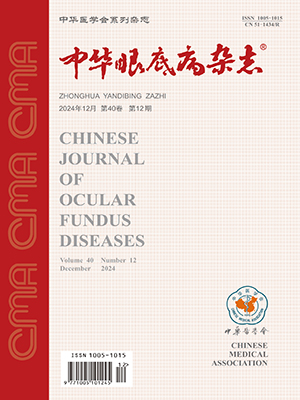| 1. |
Clarhson J. Natural history and clinical management of central retinal vein occlusion[J]. Arch Ophthalmol, 1997, 115(4): 486-491. DOI: 10.1001/archopht.1997.01100150488006.
|
| 2. |
Parodi MB, Visintin F, Della RP, et al. Foveal avascular zone in macular branch retinal vein occlusion[J]. Int Ophthalmol, 1995, 19(1): 25-28. DOI: 10.1007/BF00156415.
|
| 3. |
Nobre CJ, Keane PA, Sim DA, et al. Systematic evaluation of optical coherence tomography angiography in retinal vein occlusion[J]. Am J Ophthalmol, 2016, 163: 93-107. DOI: 10.1016/j.ajo.2015.11.025.
|
| 4. |
Samara WA, Shahlaee A, Sridhar J, et al. Quantitative optical coherence tomography angiography features and visual function in eyes with branch retinal vein occlusion[J]. Am J Ophthalmol, 2016, 166: 76-83. DOI: 10.1016/j.ajo.2016.03.033.
|
| 5. |
Suzuki N, Hirano Y, Tomiyasu T, et al. Retinal hemodynamics seen on optical coherence tomography angiography before and after treatment of retinal vein occlusion[J]. Invest Ophthalmol Vis Sci, 2016, 57(13): 5681-5687. DOI: 10.1167/iovs-16-20648.
|
| 6. |
Ghasemi FK, Iafe NA, Hubschman JP, et al. Optical coherence tomography angiography analysis of the foveal avascular zone and macular vessel density after anti-VEGF therapy in eyes with diabetic macular edema and retinal vein occlusion[J]. Invest Ophthalmol Vis Sci, 2017, 58(1): 30-34. DOI: 10.1167/iovs.16-20579.
|
| 7. |
Michaelides M, Fraser-Bell S, Hamilton R, et al. Macular perfusion determined by fundus fluorescein angiography at the 4-month time point in a prospective randomized trial of intravitreal bevacizumab or laser therapy in the management of diabetic macular edema (Bolt Study): report 1[J]. Retina, 2010, 30(5): 781-786. DOI: 10.1097/IAE.0b013e3181d2f145.
|
| 8. |
Balaratnasingam C, Inoue M, Ahn S, et al. Visual acuity is correlated with the area of the foveal avascular zone in diabetic retinopathy and retinal vein occlusion[J]. Ophthalmology, 2016, 123(11): 2352-2367. DOI: 10.1016/j.ophtha.2016.07.008.
|
| 9. |
Campochiaro PA, Bhisitkul RB, Shapiro H, et al. Vascular endothelial growth factor promotes progressive retinal nonperfusion in patients with retinal vein occlusion[J]. Ophthalmology, 2013, 120(4): 795-802. DOI: 10.1016/j.ophtha.2012.09.032.
|
| 10. |
Ou WC, Lampen SIR, Wykoff CC. Longitudinal quantification of retinal nonperfusion in the macula of eyes with retinal vein occlusion receiving anti-VEGF therapy: secondary analysis of the WAVE randomized trial[J]. Ophthalmic Surg Lasers Imaging Retina, 2018, 49(4): 258-264. DOI: 10.3928/23258160-20180329-08.
|
| 11. |
Abri AK, Reznicek L, Soltan SM, et al. Anti-VEGF treatment and peripheral retinal nonperfusion in patients with central retinal vein occlusion[J]. Clin Ophthalmol, 2017, 11: 331-336. DOI: 10.2147/opth.s125486.
|
| 12. |
Spaide RF. Peripheral areas of nonperfusion in treated central retinal vein occlusion as imaged by wide-field fluorescein angiography[J]. Retina, 2011, 31(5): 829-837. DOI: 10.1097/iae.0b013e31820c841e.
|
| 13. |
Sellam A, Glacet-Bernard A, Coscas F, et al. Qualitative and quantitative follow-up using optical coherence tomography angiography of retinal vein occlusion treated with anti-VEGF: optical coherencetomography angiography follow-up of retinal vein occlusion[J]. Retina, 2017, 37(6): 1176-1184. DOI: 10.1097/IAE.0000000000001334.
|
| 14. |
李可嘉, 喻晓兵, 戴虹. 视网膜分支静脉阻塞继发黄斑水肿抗血管内皮生长因子药物治疗前后黄斑区微血管结构改变[J]. 中华眼底病杂志, 2019, 35(1): 25-30. DOI: 10.3760/cma.j.issn.1005-1015.2019.01.006.Li KJ, Yu XB, Dai H. The alterations of microvascular structure in branch retinal vein occlusion eyes before and after anti-vascular endothelial growth factor drug therapy[J]. Chin J Ocul Fundus Dis, 2019, 35(1): 25-30. DOI: 10.3760/cma.j.issn.1005-1015.2019.01.006.
|
| 15. |
Tan PE, Yu PK, Balaratnasingam C, et al. Quantitative confocal imaging of the retinal microvasculature in the human retina[J]. Invest Ophthalmol Vis Sci, 2012, 53(9): 5728-5736. DOI: 10.1167/iovs.17-22542.
|




